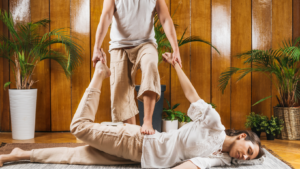In the hustle and bustle of today’s world, finding time to unwind is more crucial than ever. Enter the realm of passive leisure activities – the unsung heroes of relaxation that don’t require much effort yet offer significant benefits. From watching a favorite TV show to simply daydreaming, these activities are all about taking a step back and letting the mind wander.
But don’t be fooled by the term ‘passive’. These activities are anything but inactive. They stimulate our minds, fuel creativity, and help us recharge. As we delve into the world of passive leisure activities, we’ll explore their importance, benefits, and how they can enhance your everyday life. So sit back, relax, and let’s embark on this journey together.
Passive Leisure Activities

Diving further into the nuances, it’s crucial to understand what encompasses passive leisure activities and why they hold a paramount position in personal wellness.
Passive leisure activities encompass the actions that involve minimal physical exercise, such as reading and watching television. These activities require little interaction and effort, facilitating mind wander, a state often linked with creativity and problem-solving.
Exploring Different Types of Passive Leisure Activities
Let’s delve deeper into the various types of passive leisure activities to better understand their benefit and appeal. From watching television to reading a book, these simple pursuits play an essential role in mental stimulation and relaxation.
Watching Television and Movies

Television and movies provide a rich source of entertainment and relaxation. However, their passive nature lets the viewer engage their mind in a different way. It’s not just about the laughter from the latest comedy or the thrill from an action-packed movie. They also serve as a catalyst for imagination and reflection. Characters and scenarios could trigger long-buried memories or spark new ideas, extending the viewing experience beyond mere entertainment.
Listening to Music
Many find solace in music’s soothing melodies after an exhausting day. Whether it’s classical, jazz, pop, or rock – music offers an avenue for emotional expression. Furthermore, lyrics often evoke intense feelings, painting vivid scenarios in listeners’ minds. Music, paired with its calming rhythms, stimulates creativity and thought processes, reinforcing its position as a classic passive leisure activity.
Reading a Book
Reading remains a timeless passive leisure activity, thriving despite the emergence of newer forms of entertainment. This activity is lauded for the solace it affords readers, allowing detachment from their reality and escape to an entirely different world. Whether it’s an intriguing mystery or an enchanting fantasy, books kindle the imagination, foster empathy, and broaden perspectives. Plus, the quiet concentration required to read effectively serves as mental exercise, making book reading both enjoyable and beneficial for cognitive development.
Benefits of Passive Leisure Activities

Delving deeper into the realm of passive leisure activities illuminates additional merits. Enhanced mental health and honed cognitive skills emerge as key arguments advocating for passive leisure activities.
Improving Mental Health
Passive leisure activities, such as viewing a captivating film or getting engrossed in a good book, aren’t just solitary indulgences. They’re therapeutic gateways opening up channels of introspection and enrichment. Psychological studies indicate a strong link between these activities and improved mental health. The release of oxytocin during such pursuits lends to a sense of calm and happiness, serving as a counter to feelings of anxiety and depression. For instance, a study published in the American Journal of Psychiatry cites a striking decrease in symptoms of depression in adults who devoted time to passive leisure activities.
Enhancing Cognitive Skills
Furthermore, passive leisure activities pack a power punch in cognitive advancement. The apparently simple acts of listening to melodious tunes or watching an intriguing documentary can be a workout for the brain. These activities, often underestimated, endorse brain plasticity, fuel memory retention, and drive the development of critical thinking skills. Scientists at the University of London found compelling evidence in their research: participants exposed to passive leisure activities exhibited greater cognitive flexibility compared to those who weren’t. The potency of such activities in sharpening cognitive skills solidifies their indispensable role in personal development.

